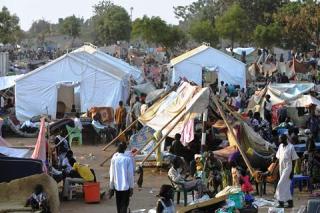Displaced S. Sudanese call for stability to be restored before elections
January 18, 2015 (KAMPALA) – Internally displaced South Sudanese have expressed concerns over the government’s decision to conduct election before peace and stability has been properly restored to the country.

Nyadien Mary, a resident of UN house in the capital, Juba, has slammed president Salva Kiir and his officials for calling an election this year, describing the decision as premature.
“Meanwhile the whole population in South Sudan is not stable. You need to work and build trust and to bring peace in order to restore the country’s unity,” she said.
She says the current security situation in South Sudan was still not under control and lamented the genesis of the crisis in mid-December 2013.
Nguen muoch Tang said he had been forced to remains under UN protection amid fears of ongoing ethnic unrest.
Tang accused the ruling party’s leadership of creating division among the people of South Sudan.
“This war was created by one section of a leader who does not want a reform within the country. A country cannot progress without critics that’s why they created crisis in order to benefit from it,” said Tang.
He said he was opposed to holding elections, saying that in the current environment they would not be free and fair and that currently it is a one-man contest, with other political parties unlikely to challenge for the presidency.
“Who will risk contesting for presidency as the environment remain unclear for free movement of any candidates to challenge president Salva Kiir?” the 40-year-old said, adding that the government should
He said the government’s decision to go ahead with elections is a clear indication that Kiir is using the country’s transitional constitution to make his own personal laws.
Lang Diar Hoth a youth leader for displaced South Sudanese sheltering at the UN house camp, said conflict victims need peace before voting for their country’s leader.
The planned election scheduled for 30 June has also been criticised by the international community, including the US, which has objected to the ballot and called for the government to work towards restoring peace.
South Sudan erupted in violence in mid-December last year following a political dispute in the country’s ruling SPLM party.
The fighting has pitted pro-government troops loyal to Kiir against rebel forces aligned with former vice-president Riek Machar, who was sacked in July 2013.
The Greater Upper Nile states region has been devastated by ongoing violence in conflict-affected zones, with large numbers of people being displaced, while many more have fled to neighbouring countries.
Machar’s rebel faction has also objected to the planned ballot, saying achieving peace should be a priority.
Meanwhile, foreign affairs minister Barnaba Marial Benjamin last week expressed disappointment after the US and several other countries indicated they would not support the poll, calling on the international community to continue working with South Sudan.
His comments came after US ambassador Charles Twining told reporters at a news conference in Juba on Friday that restoring peace should be prioritised before elections are held.
“We continue to think that there was not much time to organise the election. There was no security for the organisation of the election and no personnel to finance this election,” he said.
However, Twining stressed as a sovereign nation it was ultimately up to South Sudan to decide whether to proceed with elections despite the current situation.
(ST)
